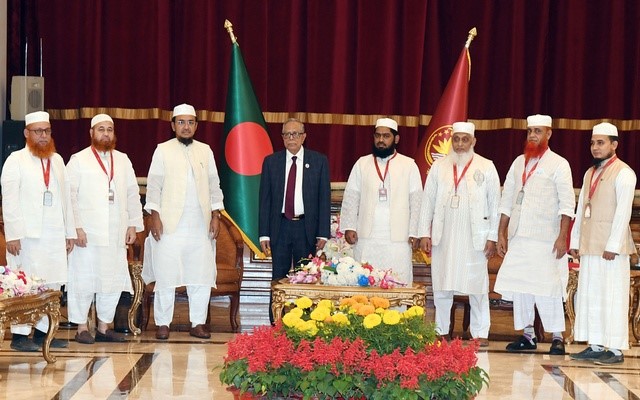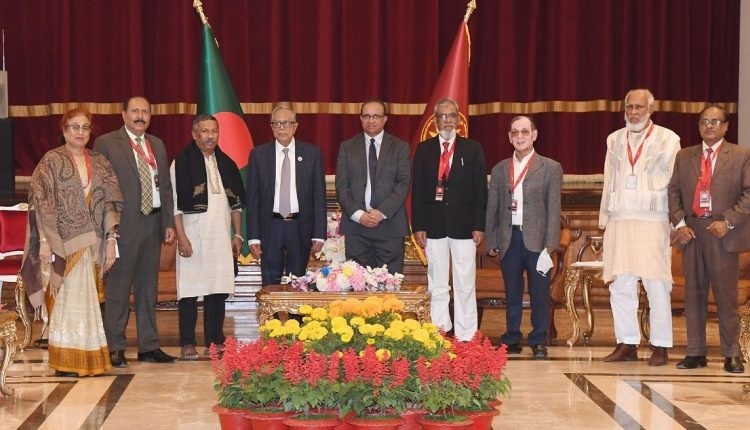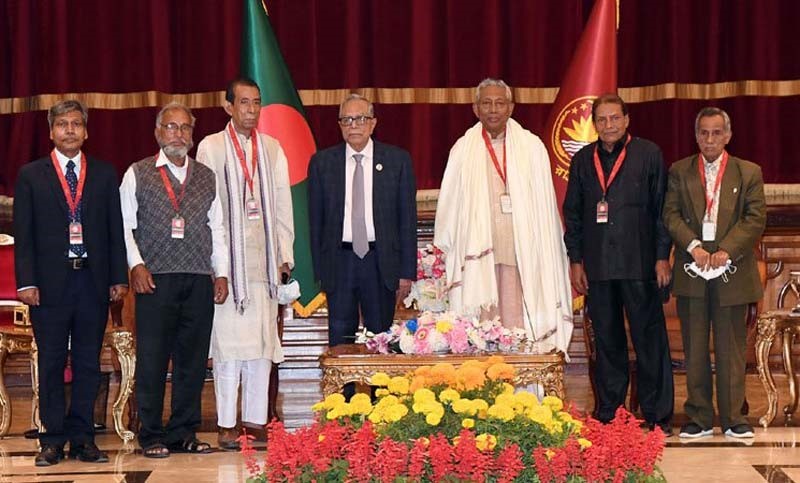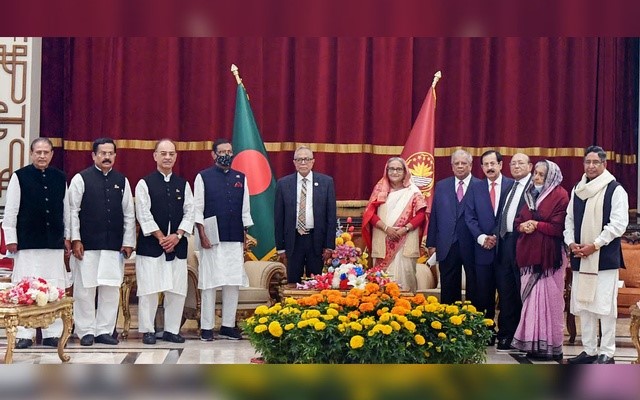Move for presidential talks, especially in view of the next national polls possibly by the fag end of next year, to form a powerful yet unbiased EC lost some charm and steam as some political parties boycotted it one after another. Although 32 registered parties were invited to participate in dialogue at Bangabhaban in phases, only 24 political parties turned up, reports Press Xpress
As the term of the current Election Commission (EC) is set to expire on February 14, President Abdul Hamid took a very timely move to hear from the political parties on formation of an impartial EC that can pave the way for free, fair, unbiased and acceptable polls in the country. But his move for talks, especially in view of the next national polls possibly by the fag end of next year, to form a powerful yet unbiased EC lost some charm and steam as some political parties boycotted it one after another.
Although boycott by the country’s major political parties of BNP’s stature disappointed many, the President went on with his good intent as talks on forming the next EC kicked off with the participation of the Jatiya Party, the main opposition party in the Parliament at present, on December 20 last. A total of 32 registered parties were invited in phases to join the talks at the President’s official residence, Bangabhaban. But only 24 political parties turned up to appear in the scene with the President.
All the parties that have so far taken part in the dialogue with the President have demanded that the EC be formed in accordance with the provisions of the constitution. As a result, pro-government and anti-government politicians of all parties feel that a kind of pressure has been put on the president for the required legislation. Other opposition parties, excluding the BNP, also demanded that a law should be enacted to form the EC as directed by the Constitution.
But due to the non-enactment of the law, the President had to form EC during the last two terms by forming search committees in consultation with various political parties. This was the third time that political dialogue has been held with the President.
Jatiya Party
The main opposition in the running Parliament, Jatiya Party proposed legislation before the formation of a new Election Commission on December 20, 2021. An eight-member delegation, led by Jatiya Party’s Chairman Golam Mohammad Quader, participated in the talks at Bangabhaban.
The party submitted three proposals to the president, with the first one to pass a law to form the EC, or issue an ordinance if the law cannot be passed due to a lack of time.
If the law cannot be passed due to a lack of time or other reasons, the second proposal says, the commission can be formed through a search committee.
The third proposal says the president will himself find competent and impartial people for appointment as election commissioners.

Jamiat Ulema-e-Islam Bangladesh
A seven-member delegation led by General Secretary of JamiatUlema-e-Islam Bangladesh, Manjurul Islam Afendi, visitedBangabhabanfor a discussion with the President on the formation of the Election Commission on December 20, 2021.
The proposals submitted by the party are for legislation to set up an Election Commission (EC), to form a neutral government for an acceptable election ceremony, and to ensure that the Election Commission has the power to reshuffle at various levels of election administration.
The party also demanded that the Election Commission be given the power to deploy the army if necessary in every national election. The party also demanded that the responsibility of the Ministry of Home Affairs, Public Administration, and Defense be entrusted to the Election Commission during the elections.
Jatiya Samajtantrik Dal (JSD)
Jatiya Samajtantrik Dal (JSD) held a discussion with the President on the formation of the EC on December 22. A seven-member delegation, led by party president Hasanul Haque Inu, participated in the discussion at Bangabhaban.

Under Article 118 of the Constitution, President Md. Abdul Hamid’s role has been sought by Jatiya Samajtantrik Dal (JSD) to enact necessary law aimed at forming the EC.
Party president Hasanul Haque Inu said they’re expecting the president’s role in enacting the law so that he does not get embarrassed to form the EC after every five years.
Prominent 37 Citizens
37 prominent citizens of the country expected a national consensus on important issues including democracy, free and fair elections, accountability and equal and fair enforcement of the law in the country in the president’s ongoing dialogue with political parties on December 22.
Tarikat Federation
Tarikat Federation held a discussion with President Md. Abdul Hamid at EC formation at Bangabhaban on27 December 2021.

The proposals made by Tarikat Federation includes legislation to set up an Election Commission is very important.
In appointing the Election Commission, the appointment of a former Appellate Division Judge, Secretary, Religious Scholar and a woman should be given priority by non-partisan debate-free persons.
Those involved in the elections, including the Ministry of Public Administration, Home Affairs, Law, should be fully under the control of the Commission from the election schedule to the announcement of election results after the election schedule to strengthen the EC.
In their last proposal they highlighted the reality of holding an election under a non-partisan, neutral government at an all-around election event.
The party also demanded a law to set up an Election Commission within the fastest time. The party has therefore proposed a discussion with everyone to draft a law and passing it in Parliament.
Khelafat Majlish
A 7-member delegation led by Dr. Ahmad Abdul Quader, Secretary General of Khelafat Majlish, participated in the dialogue with President at Bangabhaban on December 27.
It noted that Chief Election Commissioner should be an honest, talented, skilled, courageous, party-neutral and knowledgeable and experienced person. He or she can be a former judge of the appellate division or a retired senior secretary.
They proposed to take necessary steps including meeting the budget required by the EC, recruiting adequate manpower and training for skill generation should be taken for smooth conduct of elections.
Khelafat Majlish proposed that selection should be kept free from the effects of money and muscle strength. Equal opportunities and security must be ensured for all. Necessary electoral laws and action have to be taken for this.
The party also proposed that the army must be associated with law enforcement and have judicial powers to instill a sense of security among voters and to avoid any untoward situation.
Lastly they proposed to make arrangements that the Election Commission will bear the responsibility and expenses of formal election campaigns other than the personal level campaign of all candidates.
Workers’ Party
Members of the Workers’ Party participated in the dialogue with the president at his official residence on December 28, 2021.

At the occasion, the delegation said it is important to ensure that the EC can function completely deregulated and independently. The party proposed to enact a law to set up an emergency election commission at the beginning of the year.
They also opined on ensuring proper enforcement of election laws from the Election Commission.
Workers’ Party also proposed to take the views of civil society representatives in setting up the Election Commission.
Bangladesh Nationalist Front (BNF)
The Bangladesh Nationalist Front (BNF) held a discussion with the President on December 29 to set up a new Election Commission. A seven-member delegation of the party led by BNF President S M AbulKalam Azad participated in the discussion.
At the occasion, BNF leaders proposed to form an election government under the leadership of the Prime Minister under Article 56 of the Constitution.
They also proposed to set up a search committee to set up an Election Commission and could appoint more than five people to the committee.
Islami Oikya Jote
Athree-member delegation led by Maulana Abul Hasanat Amini, chairman of the Islamic Unity Alliance (Islami Oikya Jote) held a discussion with President at his residence on December 29, 2021.

During the time, the party proposed select members of the inquiry committee from among acceptable and reliable and trustworthy people holding constitutional office
They proposed to constitutes a permanent legal framework for the constitution of EC under Article 118 of the Constitution
Islami Oikya Jote proposed the Executive Department to provide full support to the Election Commission and make permanent laws in the event of elections as per the provisions of Article 126 of the Constitution.
They lastly proposed to ensure neutrality in forming a party influence-free election commission in the interest of a free and fair election.
Gano Forum
The Gano Forum led by Mokabbir Khan, who won from Sylhet-2 seat in the 11th parliamentary elections, held the discussion with the President on January 2, 2022.

Gano Forum leaders have made a few rounds of proposals, including legislation, by the Election Commission under Article 118 (1) of the Constitution.
The Gano Forum has demanded the formation of an Election Commission through legal process to ensure that people can vote freely.
They proposed to the President to set up an Election Commission keeping in mind the spirit of freedom, democracy and liberation war.
Bikalpa Dhara Bangladesh
The dialogue with the seven-member Bikalpa Dhara Bangladesh delegation was held at Bangabhaban on January 2. Major (retd) Abdul Mannan, the party’s top secretary general, led the delegation.

In the dialogue with the President, Bikalpa Dhara Bangladesh has voted in favour of enacting the Election Commission in accordance with the Constitution.
In addition to legislation, Bikalpa Dhara Bangladesh has also proposed a name for the formation of a search committee. The team has proposed three names for the search committee. They are Rokeya Afzal Rahman, a businessman and former caretaker government adviser, Mohammad Mosharraf Hossain Bhuiyan, a former cabinet secretary, and a prominent educationist and Muhammad Zafar Iqbal.
Ganotantri Party
The dialogue with Ganatantri Party was held at Bangabhaban on January 3.
The Ganatantri Party made eight-point proposals to the President, including enacting laws to form the EC and forming a Constitutional Council.
The party also proposed that the law may provide for the formation of a Constitutional Council consisting of the Prime Minister, Leader of the Opposition, Speaker, Chief Justice and the Attorney General.
Bangladesh Khilafat Andolan
On January 3, the Bangladesh Khilafat Andolan took part in the dialogue to form an independent, neutral and acceptable election commission.
The Bangladesh Khilafat Andolan put forward a six-point proposal including the enactment of a permanent law for the formation of a neutral, capable, strong, efficient and competent Election Commission.
The party demanded that religious haters, identified corruptors, black money owners, illegal property legitimizers, murderers-terrorists, convicted criminals and those associated with defaulters must be declared ineligible for election.
The Khilafat Andolan has also demanded disqualification of drug addicts from elections.
They also demanded that even after passing the election, if the medical test shows evidence of drug use, then his MP post will have to be canceled.
They have proposed to make the obligation of 33% women leadership in political parties optional.
Bangladesh Samyabadi Dal
A leftist organization, Bangladesh Samyabadi Dal has made a five-point proposal including the enactment of a law to form an Election Commission (EC) acceptable during the dialogue with President Abdul Hamid on January 4.

The party also proposed the formation of an election-time government under the leadership of the Prime Minister. They proposed to form a council consisting of constitutional bodies to form search committees in the absence of law.
Gono Front
On January 8, the Gono Front made 14 proposals to take part in the dialogue with President Md. Abdul Hamid on the formation of the Election Commission.
The leaders of the Gono Front proposed to keep a clear declaration in the election law so that there would be no government interference in the election.
They said boycotting the election dialogue will not solve all the problems. They proposed the formation of an election-time government led by the incumbent Prime Minister, comprising the political parties that were represented in the Parliament since independence.
At the occasion, the party also proposed the names of five members to form the Election Commission.
Krishak Sramik Janata League
During the dialogue with the President Md. Abdul Hamid to form the Election Commission on January 9, The Krishak Sramik Janata League made six proposals including law-making. The delegation, led by Krishak Sramik Janata League president Quader Siddiqui, proposed holding a national election by forming an electoral government consisting of all registered political parties.

The party proposed the formation of a five-member election commission by trusted and acceptable personnel of the country, which would include at least two women members.
They also asked the Election Commission not to formulate any election rules without seeking the views of the registered political parties.
National Awami Party (NAP)
On 11 January, an eight-member delegation led by Jebel Rahman Gani, Chairman of Bangladesh NAP, separately took part in the dialogue at the Darbar Hall of Bangabhaban. In the dialogue, acting president of National Awami Party Ivy Ahmed presented a 7-point proposal to the President to form an election commission.
The party proposed to formulate a law for the formation of the Election Commission according to Article 118 of the Constitution.
They demanded that while forming the EC, aspirants having competence, efficiency, honesty and respectability with the spirit of the liberation war should be appointed.
They also proposed establishing an accountable election commission and disqualifying any individuals and political parties who oppose the spirit of independence.
Islamic Front Bangladesh
On January 11, during the dialogue with President Md. Abdul Hamid to form an acceptable election commission, Islamic Front Bangladesh made five proposals including enactment of law.
The party proposed to form a transparent, accountable, self-sufficient, strong, and independent election commission according to the constitution.
They proposed to keep the overall election activities completely free from the influence of the government and out of the purview of the executive branch.
Islamic Front Bangladesh said that the concerned authorities are obliged to provide military, paramilitary, and law enforcement forces as required to facilitate the work of the commission.
They demanded that all the advice and instructions of the Election Commission, including the airing of radio, television and all broadcast media authorities should be obliged to broadcast properly.
The party also urged to prepare a final draft of the law in this regard by issuing an ordinance and approving it in Parliament after its enactment.
National People’s Party (NPP)
The National People’s Party (NPP) has put forward five proposals, including the formation of an Election Commission (EC) through a search committee and an electoral government led by the Prime Minister, in a dialogue called by the President to form Election Commission on January 12.
The party recommended formation of a search committee consisting of honest and experienced people.
They proposed to form an election commission consisting of honest, non-partisan people believing in the spirit of liberation war and to make the election commission independent and neutral.
The party proposed to form an electoral government with the leaders of the registered political parties who believe in the spirit of the Liberation War under the leadership of the Prime Minister as per Article 56 of the Constitution.
Zaker Party
Zaker Party proposed four points in the dialogue with the President on the formation of the Election Commission on January 13.
The party demanded a permanent solution to occupying polling stations, and fights, over-voting and casualties that occur in the country.
They proposed e-voting system for voters to cast vote sitting at home by using modern technology.
The party demanded that e-voting should be done at home through the use of block-chain technology.
They proposed that a search committee should be formed with representatives of all registered political parties to form a more acceptable election commission without controversy.
Bangladesh Kallyan Party
On January 13, the Bangladesh Kallyan Party took part in the dialogue with President Abdul Hamid on the formation of the Election Commission.

At the occasion, the party proposed to enact electoral law. If not possible, he proposed to form an election commission by issuing an ordinance.
They proposed to ensure the cooperation of the executive branch and the accountability of the Election Commission and the government to the Election Commission by Article 126 of the Constitution.
The party has named three people for the search committee.
They also demanded better treatment for BNP chairperson Begum Khaleda Zia, although outside the agenda.
Bangladesh Jatiya Party (BJP, led by Andaleeve Rahman Partho)
The Bangladesh Jatiya Party (BJP), led by Andaleeve Rahman Partho, took part in the dialogue called by the President to form the Election Commission on January 13.

The party has urged the President to take up the matter of Khaleda Zia’s treatment in the Cabinet, due to the humanitarian reason as well as future of the politics, the politicians, and relations with all parties.
The BJP has insisted on enacting a law to form an election commission.
The party has said that the army will be involved in the election, including the enactment of the law. They also said that no neutral election is ever possible under the party government.
Bangladesh Awami League
Incumbent ruling party Awami League made various proposals for the formation and reform of an independent, neutral and strong Election Commission, including strengthening the EC and increasing EC’s financial and technical capacity while taking part in the President’s dialogue on the formation of a new EC on January 17.

They proposed that the President shall appoint the Chief Election Commissioner and other Election Commissioners by the provisions of Article 118 of the Constitution.
The party proposed that, in the process of appointment of the Chief Election Commissioner and other Election Commissioners as the President may deem fit, he shall appoint the Chief Election Commissioner and other Election Commissioners.
Bangladesh Awami League also proposed that an appropriate law may be enacted for the appointment of the Chief Election Commissioner and other Election Commissioners subject to the provisions of Article 118 of the Constitution. As there is no such law at present, by the provisions of Article 118 of the Constitution, the President has no obligation to abide by any law other than the Constitution in appointing the CEC and the other Election Commissioners.
The party proposed that in the interest of free, fair, and transparent elections, it is necessary to ensure the use of more information technology in all elections.
Lastly, it’s true that President’s sensible move aimed at forming a credible EC spurred hope among many including the civil society, political quarters and the diplomatic circle. But apparent indifference by a leading political party like BNP and its allies to some extent dashed any big hope whatsoever. Still, the President, being the statesman he is and guardian of the Constitution, reserves the right within his own capacity to do anything deemed necessary for the greater good with regard to forming an impartial EC, which, in turn, may go a long way to help hold a participatory national election craved for long by the countrymen. Let’s hope the President’s eagerness for an acceptable EC, coupled with his years of experience and farsightedness as the leader of the country, yields good result this time!

